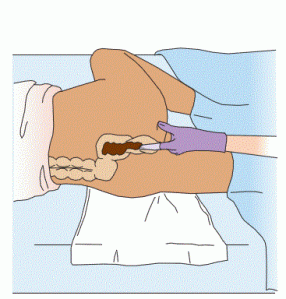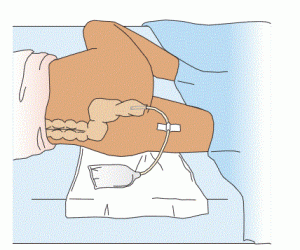Fecal Impaction
A fecal impaction occurs when constipation is not relieved. The feces build up in the rectum and become harder and harder as more and more fluid is absorbed. Eventually, it becomes almost impossible to pass the feces normally. The impaction blocks the passage of normal stool, but liquid stool may go around the impacted mass. A person with an impaction is usually very uncomfortable, and may complain of abdominal or rectal pain or of liquid feces “seeping” out of the anus. The person’s abdomen may be swollen.If a person is thought to have a fecal impaction, a digital examination is done. During the digital examination, a finger is inserted into the person’s rectum to feel for the impacted mass (digital means “finger”). The impaction is then removed by using the finger to break the impacted feces apart and scoop it out of the rectum piece by piece. The doctor may also order the use of an oil retention enema or medication to help remove the impaction. Digital removal
of a fecal impaction is very uncomfortable and embarrassing for most patients and residents. Many facilities require that a nurse remove an impaction,but your assistance will be necessary. If you are allowed to remove an impaction, make sure you have been adequately trained for the procedure and that it is part of your job description.
Flatulence
Flatulence is the presence of excessive amounts of flatus (gas) in the intestines, causing abdominal distension (swelling) and discomfort. Sometimes people have difficulty passing flatus because of a lack of activity or a recent surgical procedure. Getting out of bed and walking might be all that is needed to help the person to expel the gas. If walking is not allowed, positioning the person on her left side may help. If the flatulence cannot be relieved with these methods, a nurse may insert a rectal tube to help the gas escape.
Fecal Incontinence
Fecal (bowel) incontinence is the inability to hold one’s feces, or the involuntary loss of feces from the bowel. Like urinary incontinence, fecal incontinence can be temporary or permanent. Temporary fecal incontinence can occur with a severe case of diarrhea,simply because the person might not be able to get to the bathroom quickly enough. Some people experience temporary fecal incontinence if the call light is not answered soon enough. Diseases or injuries that affect the nervous system can also result in temporary or permanent fecal incontinence. A person who is unconscious will be incontinent of feces.A person who has dementia will develop fecal incontinence as the disease progresses.Bowel training is very similar to bladder training and works to promote regular, controlled bowel movements.Offering the commode or bedpan at regular scheduled intervals is a common method of bowel training. Bowel training is often started by keeping track of when an incontinent person usually has a bowel movement, then making sure to provide the appropriate toilet facilities during that time period.

